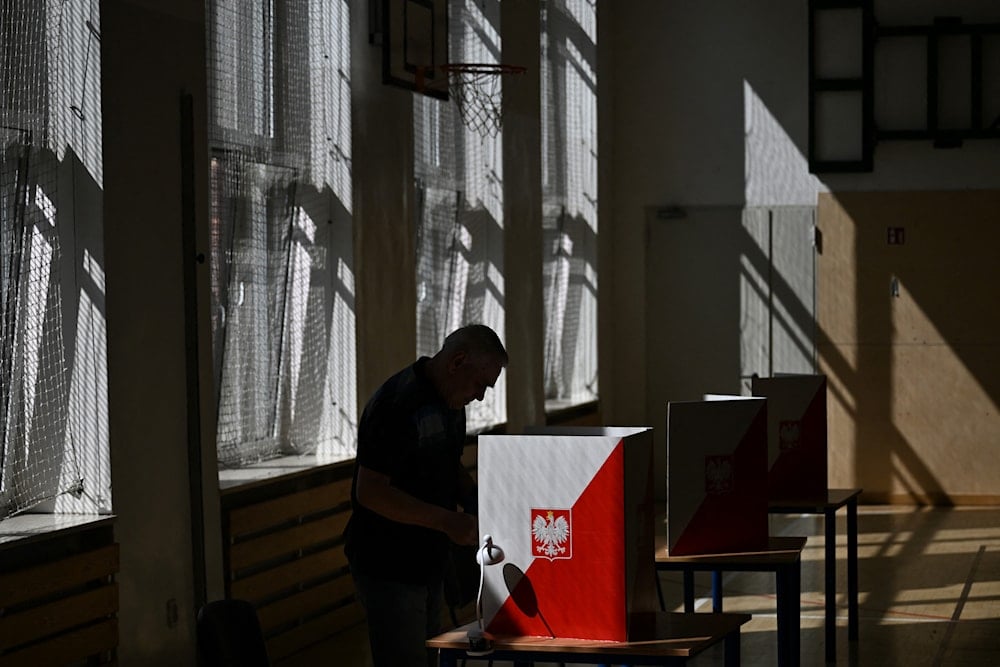Poles choose between pro-EU Trzaskowski and nationalist Nawrocki
Poles vote in a tight 2025 presidential election that could steer Poland toward the EU mainstream or Trump-style nationalism.
-

A man fills out his ballot papers at a polling station in Warsaw, Poland, on June 1, 2025, during the second round of the presidential elections (AFP)
Poland is holding a closely watched presidential election on Sunday that could shape the country’s trajectory on foreign policy, democratic governance, and national identity, Reuters reported.
The contest between Civic Coalition (KO) candidate Rafal Trzaskowski and nationalist-backed Karol Nawrocki is seen as a critical moment for Poland’s place in either the European Union mainstream or a path echoing Donald Trump-style nationalism.
Pre-election polls showed a razor-thin lead for Trzaskowski, but the race remained too close to call. Voting is set to conclude at 9 pm local time, with exit polls expected shortly after. The National Electoral Commission said it aimed to announce final results by Monday morning or early afternoon.
While executive power largely rests with the Polish parliament, the president retains veto authority, making the role significant in shaping legislation and foreign alliances. The vote is also being monitored closely by regional actors, including Russia, Ukraine, and the United States.
Read more: Poland allocates 5% of GDP for defense spending as Ukraine war resumes
Poland’s foreign policy at a crossroads
Foreign policy was a central issue in the 2025 election, with both candidates supporting increased defense spending and continued backing for Ukraine. However, their strategic visions differ sharply.
Trzaskowski advocates for strong ties with both Brussels and Washington, emphasizing Ukraine’s eventual NATO membership as crucial for Polish and regional security.
Nawrocki, in contrast, has warned that Ukraine’s NATO accession could provoke broader conflict with Russia and has said he would not ratify it as president.
He has emphasized closer alignment with the United States, meeting with President Donald Trump in the White House earlier this year. Trzaskowski, meanwhile, has positioned himself as a pro-European moderate seeking to rebuild strained ties with EU institutions.
Read more: Polish president urges US to deploy nuclear weapons in Poland: FT
Trump-style nationalism vs pro-European centrism
The presidential runoff followed a first round on May 18, where far-right anti-establishment forces saw a notable rise. Nevertheless, the second round again featured candidates from the two dominant parties, KO and Law and Justice (PiS), signaling the continued influence of traditional political blocs despite growing public discontent.
Nawrocki has styled his campaign after Trump’s Make America Great Again movement, pledging to restore what he calls traditional Polish values and sovereignty. He has repeatedly accused KO of catering to urban elites, saying at a rally in Biala Podlaska, “They want to build a Poland for the elites.”
In contrast, Trzaskowski focused his message on hope, European integration, and civic unity. “Looking at this mobilisation, I see how much hope you have – hope in a future in which Poland plays a leading role in the European Union,” he told supporters in Ciechanów.
Voter turnout remains high in key cities
Turnout stood at 24.8% by noon, according to electoral commission head Sylwester Marciniak, nearly identical to the same point during the second round of the 2020 presidential vote, which eventually saw 68.2% participation. High turnout among young and urban voters could once again prove decisive.
Prime Minister Donald Tusk, who came to power in late 2023, is also facing his first major electoral test. Analysts note that Trzaskowski’s performance could reflect broader public approval or disapproval of the coalition government.
Social issues, identity politics define the divide
Beyond foreign policy, the two candidates diverge sharply on social issues. Trzaskowski supports liberal reforms, including the liberalization of abortion laws. Nawrocki, aligned with Poland’s Catholic conservative base, opposes such measures.
For many voters, the election was deeply personal. “The most important thing is foreign policy,” said Warsaw IT worker Robert Kepczynski, 53. “We can’t look both ways, to the US and the EU – and looking only to the US for help is short-sighted.”
Economist Maria Luczynska, 73, expressed emotion after casting her vote: “It’s important because this is how we decide our future. What country my daughter, my grandchildren will live in.”
Read more: US relocates troops in Poland, to halve troops in eastern Europe

 4 Min Read
4 Min Read










